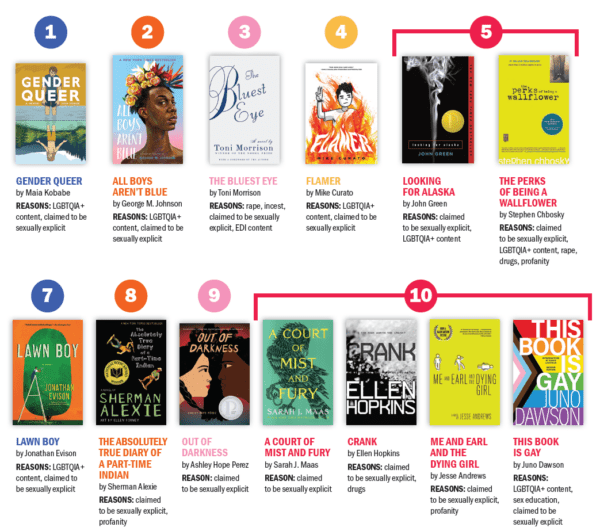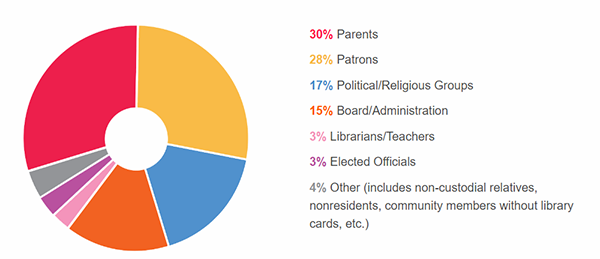Lefties Rail Against Library Book Bans
Jared Taylor, American Renaissance, June 15, 2023
Subscribe to future audio versions of AmRen articles here.
On Monday, the governor of Illinois signed a law to ban the banning of library books. “Here in Illinois, we don’t hide from the truth, we embrace it,” said Democrat governor Jay Robert Pritzker. “Young people shouldn’t be kept from learning about the realities of our world; I want them to become critical thinkers, exposed to ideas that they disagree with . . . .We are showing the nation what it really looks like to stand up for liberty.” The signing ceremony was at the Harold Washington Library in Chicago, named for the city’s first black mayor.
Tracie Hall, a Chicago native and executive director of the American Library Association, praised the new law: “We insist that free people must always read freely. . . . History will surely assess this moment and . . . note that we . . . did not stand idly by and let the right to read and to freely access libraries be taken from us.” It’s nice to see such ardent defenses of free speech.
The law is being reported as a blow against attempts to ban books — mostly children’s books — that tell the truth about American race relations and about sex and gender. “All Illinoisans deserve to see themselves reflected in the books that they read, the art that they see, the history they learn,” said Mr. Pritzker. The New York Times cites a report from the American Library Association (ALA): “[T]he vast majority [of banned books] were written by or about members of the LGBTQIA+ community or by and about Black people, Indigenous people, and people of color.”
Mr. Pritzker even tweeted this (though the Times passed over it in silence): “This is the Land of Lincoln. I refuse to let a dangerous strain of white nationalism determine whose histories are told in Illinois. Because what these book bans in libraries really are about is censorship — marginalizing people, ideas, and facts.” I hadn’t heard that “dangerous” white nationalists — different, I suppose, from the benign kind — have been silencing BIPOCs, but Mr. Pritzker must read the news more closely than I.
The ALA says that 2022 had “the highest number of attempted book bans since ALA began compiling data about censorship in libraries more than 20 years ago.” That was 1,269 attempts on 2,571 titles. In 2021, there were reportedly only 729 attempts.
So which books are making people angry? ALA lists the 13 top targets, noting that they are “evidence of a growing, well-organized, conservative political movement, the goals of which include removing books about race, history, gender identity, sexuality, and reproductive health from America’s public and school libraries.” However, all 13 were attacked for LGBTQIA+ content, explicit sex, and sometimes profanity, rape, or drug-taking. The two titles that stirred up the most people were Gender Queer and All Boys Aren’t Blue. Just one title was reportedly attacked for “EDI content,” or equity, diversity, and inclusion, although people also complained about rape, incest, and explicit sex.

The ALA also lists the 100 most complained about books from 2010 to 2019. Anne Frank’s Diary is on it, and so are Huckleberry Finn, To Kill a Mockingbird, The Holy Bible, 1984, Lolita, Of Mice and Men, Brave New World, Heather Has Two Mommies, and Fifty Shades of Gray. As for the rest, it’s hard to tell just from titles why people didn’t like them, but This Book is Gay, Jacob’s New Dress, Sex is a Funny Word, and Two Boys Kissing are hints. The ALA does not say if any of them were targets because they make white people look bad, but Mr. Pritzker didn’t identify any white nationalists, either.
The ALA reports that “these [conservative] groups distribute book lists to their local chapters and individual adherents, who then utilize the lists to initiate a mass challenge that can empty the shelves of a library.” If a library had only 2,571 books — the very ones that were targets of attempted bans last year — and every challenge succeeded, the shelves would, indeed, be empty. In Mr. Pritzker’s state, where white nationalism is reportedly a problem, there were 67 attempts to ban books.
The ALA doesn’t say how many books were successfully banned. Isn’t that at least as important as the number of banning attempts? The association counts a lot of other things, though. In a section called Censorship by the Numbers, it tells you, for example, where censorship is worst (Texas, with 93 attempts to ban books) and absent (Nevada, not even one attempt). It also explains who files complaints, with parents and library patrons the worst offenders. These are, presumably, Mr. Pritzker’s white nationalists.

Illinois’ new law requires that all libraries fight censorship by coming up with a version of the ALA policy on book banning. I assumed the policy would have weaselly language about “hate” or “misinformation.” I was wrong. The policy is airtight:
I. Materials should not be excluded because of the origin, background, or views of those contributing to their creation. II. Libraries should provide materials and information presenting all points of view on current and historical issues. Materials should not be proscribed or removed because of partisan or doctrinal disapproval.
There is extensive ALA-endorsed commentary on this policy, not all of which I claim to have read, but I found no exception for “hate.” The ALA stands for free-speech absolutism. This applies also to meeting rooms and exhibit spaces in libraries.
Almost all libraries are maintained, at least in part, at public expense. If libraries should protect what the ALA calls the “freedom to read,” should there not be equal freedom to buy books on the internet? I wonder why I have never heard of the ALA opposing book bans by Amazon or eBay. Why isn’t the ALA counting the titles Amazon refuses to sell? Why isn’t it as angry at people who want Amazon ban my books as it is about PTA moms who don’t like Two Boys Kissing? Why doesn’t it speak out against social-media censorship? At least, within its own domain, the American Library Association is admirably principled.
When Illinois’ new law goes into effect on January 1st, I look forward to exhibits of classic books on race and IQ, beginning with The Testing of Negro Intelligence. I expect to see displays on vaccine skepticism, holocaust revisionism, eugenics, conversion therapy, creationism, and learned analysis of Barack Obama’s birth certificate.
I’m grateful to Governor Pritzker for his heartfelt endorsement of free speech, and I hope he will be just as energetic in restoring it to the internet.















